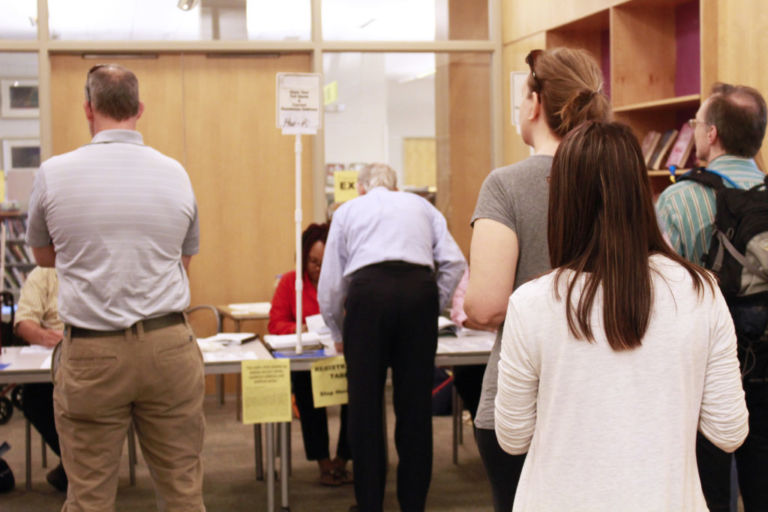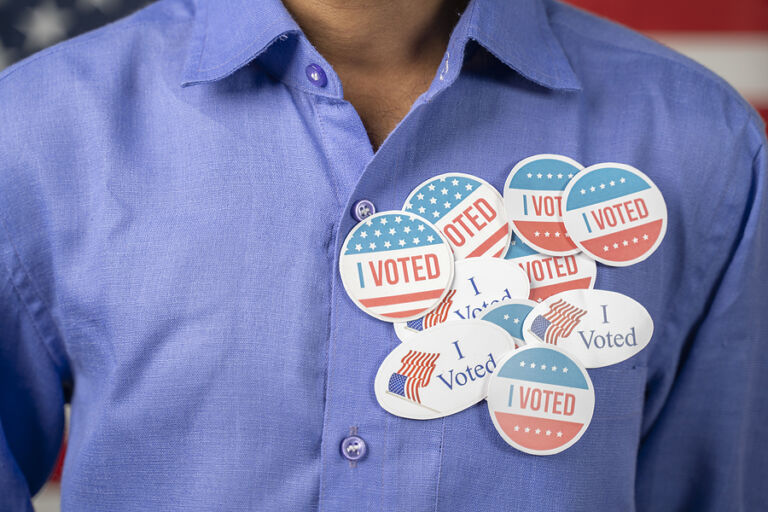- Voter list maintenance “ensures ineligible voters are not included on poll books, reduces the possibility for poll worker error and decreases opportunities for fraud”
- Joining the Electronic Registration Information Center would help the boards of elections in North Carolina more effectively conduct list maintenance
- The State Board of Elections is already legally empowered to join ERIC, but it needs the General Assembly to pay for it
(UPDATE: North Carolina should take steps to protect data privacy or withdraw from ERIC.)
Keeping voter rolls clean is a crucial part of maintaining election security. The North Carolina State Board of Elections (SBE) currently does that alone. But there is an interstate system that would allow the state board to share and use data to make our elections more secure.
Why do county boards of elections need to conduct list maintenance?
List maintenance is an important part of keeping North Carolina’s voting rolls clean. The SBE notes why maintaining clean voter rolls is important:
Voter roll list maintenance is important because it ensures ineligible voters are not included on poll books, reduces the possibility for poll worker error and decreases opportunities for fraud.
Voter list maintenance is not an easy task, however. Neal Kelley, chair of the US Election Assistance Commission’s Board of Advisors, explained:
[T]here are no requirements for voters to update their information. Election officials should be “chasing” voters to keep their lists up-to-date. Think about this fact – the first thing most people do when they move is to notify their family, banks and schools – which means that voter registration is often the last thing on their mind.
The General Assembly authorized the SBE by statute (163-82.14.(a)) to use additional data to help with list maintenance, including “entering into data sharing agreements with other states to cross-check information on voter registration and voting records.” To that end, North Carolina joined the “Interstate Crosscheck” program starting with the 2014 election. That program, however, was accused of using inaccurate data and was shut down in 2017 due to “security vulnerabilities” in how it handled data.
There is an alternative interstate data cross-checking service available: to help our county boards of elections with list maintenance, North Carolina should join ERIC.
What is ERIC and how would North Carolina benefit from joining it?
The Electronic Registration Information Center (ERIC) is a nonprofit corporation registered in Delaware with a stated goal to “improve the accuracy of America’s voter rolls and increase access to voter registration for all eligible citizens.”
It accomplishes those goals through systematic sharing of data between member states and from national sources such as the US Social Security Administration’s death index and data from the US Postal Service to member states. The data shared includes names, addresses, dates of birth, and the last four digits of social security numbers. All personal data are encrypted to help prevent the kinds of security breaches that had plagued the Crosscheck program. According to ERIC, they helped member states identify 1,524,301 interstate duplicates (“cross-state movers”), 1,249,344 in-state updates, 136,091 in-state duplicates, and registrations for 72,986 deceased voters.
At the same time, the data-sharing arrangement helps election officials identify people who are legally eligible to vote in their state but have not yet registered.
If North Carolina were to join ERIC, the state government would commit to (scroll down to Exhibit A):
- Pay annual dues
- Share voter files and Department of Motor Vehicles records with ERIC
- Share other relevant data to the best of the state’s ability
- Protect private data
- Start the process of removing ineligible voter registrations and contact eligible unregistered people to tell them how to register to vote
ERIC is not the province of any one ideological camp. It has member states from across the political spectrum, from more progressive states such as Illinois, Connecticut, and Washington, to more conservative states such as Utah, South Carolina, and Texas. In all, 30 states plus the District of Columbia are members of ERIC.
Joining ERIC would not be a matter of “how,” but of “how much?”
As previously noted, the SBE is already authorized to join “sharing agreements with other states” to help maintain voter rolls, so no new legislation would be required for North Carolina to join ERIC.
What would be required is for the General Assembly to provide funding for North Carolina to join and remain a member.
There is a one-time, $25,000 membership fee to join. Annual dues are based on $947,000 divided among the 31 members (32 if North Carolina joined), which would be under $30,000 per state per year. This seems like a minor expense to better ensure election integrity. The bigger expense would be mailing cards to the up to two million North Carolina residents who are eligible to register to vote that explain to them how to register, as mandated by ERIC’s membership agreement.
According to an email from SBE public information officer Patrick Gannon, the SBE currently pays for data from the Postal Service’s National Change of Address system and the Social Security Administration’s Limited Access Death Master File. ERIC provides those data to members, meaning that membership in ERIC would partially pay for itself through the savings realized by SBE not having to buy those data separately.
Joining ERIC would not be a panacea; the SBE would still have to conduct its own list maintenance work and continue to be on guard against threats to the integrity of our elections. Nevertheless, it would be a strong tool to help keep our elections more secure.


